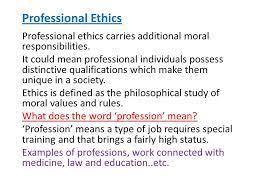Professional Ethics is a set of standards that govern the conduct of individuals within a professional setting. It is a code of conduct that outlines the duties and responsibilities of professionals to their clients, colleagues, employers, and the public. Professional Ethics sets out the moral principles that guide decisions and actions within a professional environment.

Professional Ethics is based on core values determining how professionals should act professionally. These core values include integrity, honesty, respect, fairness, responsibility, trustworthiness, and confidentiality. These values ensure that professionals maintain high standards of conduct and adhere to a code of conduct that is suitable for the profession.
The first core value of Professional Ethics is integrity. Integrity is the foundation of any professional relationship and is essential for maintaining a professional relationship. When a professional acts with integrity, they are honest, trustworthy, and reliable. This means that they are not engaging in unethical or illegal behavior.
The second core value of Professional Ethics is honesty. Honesty is essential to any professional relationship and is necessary for a successful professional relationship. Professionals must be honest with their clients, colleagues, employers, and the public. This is important to ensure that all parties involved understand and accept the ethical standards that are being upheld.
The third core value of Professional Ethics is respect. Respect is essential for a successful professional relationship and for maintaining a positive professional relationship. Professionals must respect the rights of their clients, colleagues, employers, and the public. This means they must treat everyone with dignity and respect and not discriminate against anyone based on race, gender, age, sexual orientation, religion, or any other protected status.
The fourth core value of Professional Ethics is fairness. Fairness is necessary for a successful professional relationship and for maintaining a positive professional relationship. Professionals must be fair when dealing with their clients, colleagues, employers, and the public. This means that they must act in a way that is fair and just to all parties involved.
The fifth core value of Professional Ethics is responsibility. Professionals must take responsibility for their actions and be accountable for their decisions. This means that they must act with integrity, honesty, and respect and be willing to take responsibility for any mistakes.
The sixth core value of Professional Ethics is trustworthiness. Trustworthiness is essential for a successful professional relationship and for maintaining a positive professional relationship. Professionals must be honest and trustworthy with their clients, colleagues, employers, and the public. This means that they must not lie, cheat, or deceive anyone.
The seventh core value of Professional Ethics is confidentiality. Confidentiality is essential for a successful professional relationship and for maintaining a positive professional relationship. Professionals must ensure that any information they receive is confidential and not shared with anyone else.
Professional Ethics is an important part of any profession and is necessary for the successful functioning of a professional relationship. Professionals must adhere to the ethical standards outlined in Professional Ethics to ensure that they maintain a positive professional relationship with their clients, colleagues, employers, and the public.